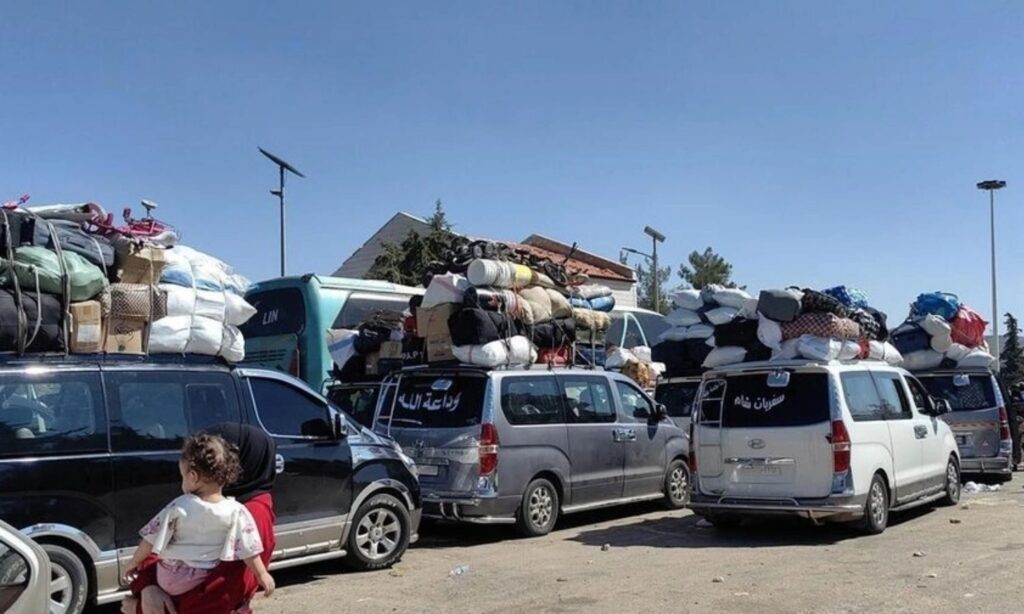The United Nations High Commissioner for Refugees (UNHCR) said that thousands of Lebanese and Syrians are fleeing from Lebanon to Syria as Israeli shelling continues.
The UNHCR stated on its official website today, Wednesday, September 25, that large crowds, including women and children, are gathering in lines after spending the night in the open amid low temperatures. Some of them suffer from new injuries caused by Israeli shelling in Lebanon.
Hundreds of vehicles are lined up at the Syrian border coming from Lebanon, while many people arrive on foot carrying what they can, according to the UNHCR.
UN High Commissioner for Refugees, Filippo Grandi, said, “The bloodshed is taking a heavy toll, pushing tens of thousands to flee their homes. It is another ordeal for families who previously fled the war in Syria and are now being shelled in the country they sought refuge in.”
He emphasized the need to avoid “these scenes of despair and destruction” once again, noting that the Middle East cannot bear a new displacement crisis, stressing that civilian lives should be a priority.
The UNHCR also mentioned that it and its partners, including the Syrian Arab Red Crescent (SARC), are present at border crossings, providing food, water, blankets, and mattresses to the arrivals, directing them towards available support once they reach Syria.
It added that the humanitarian situation in Syria remains dire, with the February 2023 earthquake and prolonged conflict disrupting essential infrastructure, leaving millions of residents in need of assistance.
According to the UNHCR, more than 27,000 people have been displaced in the past 48 hours, and more are leaving their homes every minute. The latest Israeli attacks have killed 558 people and injured 1,835 others.
The UNHCR noted that it is responding to the needs of forcibly displaced persons across Lebanon, in coordination with authorities and other humanitarian organizations, standing ready to assist more civilians who fled from the air raids, providing them with shelter, healthcare, and psychosocial support.
The UNHCR also pointed out that Lebanon hosts an estimated 1.5 million Syrian refugees and over 11,000 refugees from other countries.
Lebanese and Syrians cross the border
Dozens of Syrians and Lebanese have crossed the border into Syrian territory as Israeli military operations in southern Lebanon intensify, with no independent entity documenting their numbers.
A correspondent for Enab Baladi in Homs reported on Tuesday, September 24, that about 100 people illegally entered Syrian territory from Lebanon, heading towards Homs from Wadi Khaled and Lebanese villages near al-Qusayr.
Some refugees have reached Homs province, all of them Syrians, while no Lebanese refugees have been reported arriving in the region, according to the correspondent.
Agence France-Presse quoted an unnamed Syrian security source stating that hundreds of people crossed the border from Lebanon to Syria amid the Israeli airstrikes, without specifying the nationality of the refugees.
Enab Baladi contacted a smuggler operating on the Syrian-Lebanese border, who said that the movement across the border is active and faces no obstacles on either side.
According to the smuggler, the cost of crossing the border from Lebanese territory to Homs province in Syria is $60 per person for those without a residence permit in Lebanon, and $30 for those with a residence permit.
Regime’s government on alert
Syrian regime president Bashar al-Assad commented on the Israeli escalation in Lebanon while chairing an orientation meeting for the newly sworn-in government.
Al-Assad told his ministers on Tuesday, September 24, “It so happened that you start your work today amid the brutal Zionist aggression on our brothers in Lebanon… However, from the first hours of your work, the main priority should be how to support our brothers in Lebanon in all fields and sectors without exception and without hesitation.”
The director of civil defence in Homs, Brigadier General Moheeb al-Modi, told the local Al-Watan newspaper on Tuesday that there are five main shelters in the province that can accommodate about 40,000 people, and nine secondary shelters that can accommodate about 25,000 people.
He added that the shelters are equipped with all necessary services, including water, electricity, sanitation, telephone, and essential shelter materials like blankets, mattresses, insulation, and kitchen utensils.
Al-Watan reported that the Jdeidet Yabous border crossing between Lebanon and Syria saw the entry of about 2,000 Lebanese citizens into Syria by noon today, noting that a similar number is waiting for the procedures to be completed to enter.
About 3,000 Syrian citizens have returned to Syria from Lebanon so far, it added.
Sham FM radio reported that the governor of Rif Dimashq, Ahmed Ibrahim Khalil, inspected the reception and departure and the completion of transactions at the Jdeidet Yabous border crossing, stressing the importance of “simplifying” the crossing procedures for arrivals.
The governor’s visit was in response to the “large numbers” of arrivals through the border, according to the local radio station.
The Homs governorate has directed a task force to take “quick response” measures and provide the necessary supplies, and reinforce medical points at the border crossings.
The radio station also quoted a security source at the same crossing saying that large numbers of Syrians and Lebanese have been displaced towards the Syrian border since this morning.
The Syrian Red Crescent said it has responded to Lebanese and Syrian families arriving in Syria from Lebanon.
In a Facebook post, it said that in response to the Lebanese and Syrian families arriving in Syria, its volunteers were deployed at the border crossings between the two countries, in the provinces of Homs, Tartus, and Rif Dimashq, to provide medical, emergency, and relief services.

